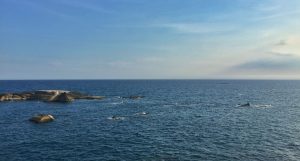In a joint statement released on April 1, China’s Ministry of Natural Resources, Ministry of Ecology and Environment, Ministry of Transport, and China Coast Guard announced the commencement of an eight-month long “Bihai 2020” (or “Blue Sea 2020”) initiative.
The Bihai 2020 initiative, which is stipulated to last from April 1 to November 30, is the latest maritime law enforcement initiative by Beijing aimed at enhancing marine environmental protection. According to the joint statement, which is available only in Chinese, the initiative focuses on combating illegal activities in eight key areas: (i) marine engineering construction; (ii) offshore oil exploration; (iii) dumping of marine waste; (iv) shipping and related operations; (v) sea sand mining and transportation; (vi) marine protected area; (vii) land-based pollution; and (viii) marine ecological environment.
Perhaps because the joint statement was only released in Chinese, with only a brief summary of the initiative reported in English by Xinhua, the Bihai 2020 initiative has not caught the attention of Southeast Asian countries. It is also likely that the seemingly uninteresting and mundane Bihai 2020 announcement was overshadowed by the rising tensions in the South China Sea in recent months. So far, none of the 10 ASEAN members states has responded to the initiative, at least in public. Academic debate on China’s possible motivations and the implications of the initiative is also notably lacking.
Is the Bihai 2020 initiative as innocent as it seems? On the surface, the initiative appears to be solely aimed at enhancing marine environmental protection. However, as noted in the joint statement, law enforcement activities conducted under the initiative would involve coastal and sea patrols, as well as remote monitoring capabilities. This presents a worrying possibility that the initiative could be used by Beijing as yet another justification for the increased presence of Chinese law enforcement vessels in the disputed South China Sea.
Within the ASEAN context, marine environmental protection is often named as one of the “low-hanging fruits” in discussions of maritime cooperation with China. Marine environmental protection efforts, and more widely nontraditional maritime security issues, are often deemed as less politically sensitive, and unlikely to result in conflict.
Nevertheless, it is important to highlight that there is often difficult to provide a clear distinction between traditional and nontraditional maritime security issues. Illegal, unreported, and unregulated (IUU) fishing is one perfect example. While IUU fishing is often categorized as a nontraditional security issue, the right to fishing resources within an individual country’s exclusive economic zone (EEZ) is closely linked the issue of sovereignty, which is a traditional security issue.
Of course, the exact geographical scope of the Bihai 2020 initiative remains ambiguous at present. The joint statement gives no indication whether the law enforcement activities would be carried out only within China’s territorial waters or have a wider application in the disputed South China Sea. Nevertheless, one must not disregard the possibility of the Bihai 2020 initiative turning into another one of Beijing’s unilateral enforcement initiatives in the disputed waters, as in the case of China’s annual fishing moratorium in the South China Sea. Such unilateral actions as part of China wider strategy aimed at establishing de facto control and legitimizing its claims in the disputed waters.
Southeast Asian countries should place more attention on the Bihai 2020 initiative before it turns into another source of conflict.
YingHui Lee is Associate Research Fellow with the Maritime Security Programme, at the S. Rajaratnam School of International Studies (RSIS), Nanyang Technological University Singapore.

































